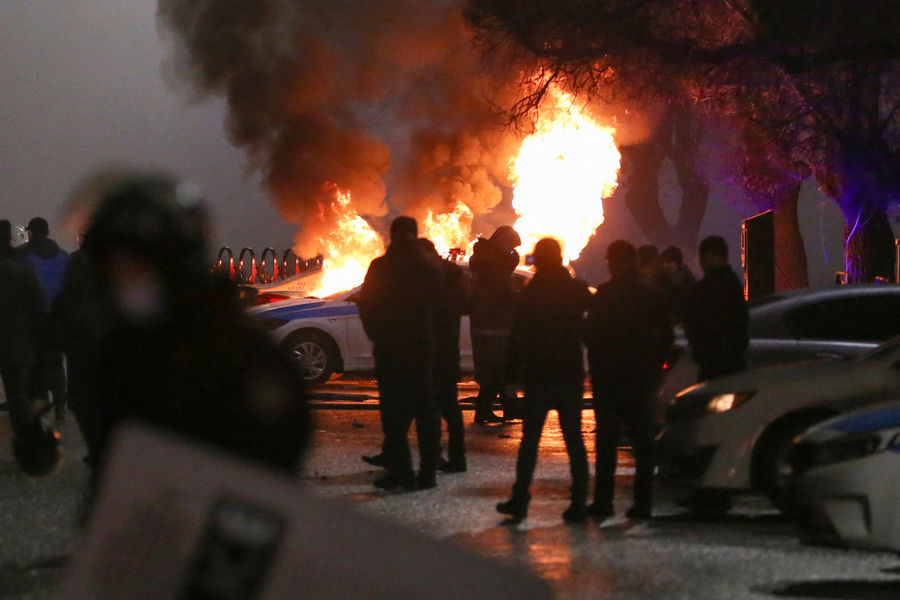
I have read the materials of some political scientists who point-blank do not want to see the growth of religiosity or divert the controversy about religious jamaats in a different direction.
More than a million citizens actively use Muslim mobile applications. Any Friday prayer gathers thousands of times more people than organized extras.
For those who do not want to notice a significant increase in religiosity and who constantly repeats the subjective observations of Shokan Valikhanov, I advise you to visit juman prayers on several Fridays, where in any weather there are more worshipers outside than inside mosques.
Another thing is that this religiosity is extremely tense, and due to the criminal inaction and incompetence of the clergy, a significant part of the believers managed to accept the imported theology of violence and hatred as faith.
Hence, more than 30 religiously motivated terrorist attacks, hundreds of Kazakhstanis who went to the zones of terrorist activity, thousands of those convicted under articles of an extremist and terrorist nature, and of course various criminal “jamaats” and hidden cells.
Two categories of Salafis are most skillfully whitewashing Salafism and pointing the arrows at the Ikhwans – the Alexandrian political Salafis and the Madkhalits. The first managed to impose their initiatives on our state as much as possible. The latter, despite the harassment by the Alexandrian Salafis, also every time try to impose their services on state bodies, especially in the field of security. But open hostility to the local culture, and indeed to the non-cult environment, all the time prevents the Madkhalits from promoting their projects.
Supporters of the Alexandrian school, who we mistakenly call Sururites (we don’t have such) are more effective in promoting Salafism due to the fact that their teaching has developed and is developing in a more secular and politically diverse Egypt than Madkhalits – a product of the services of the monarchy, where any political activity strictly sanctioned by the top. If we analyze the statements of Yasser Burkhami, Ahmad Farid, Muqaddim and other Alexandrian leaders, we can see how their speeches change depending on the political situation. The same can be said about their Kazakh followers. What constructions, slogans and appeals did they not use to whitewash Salafism? It is a paradox, but a fact that the critics of political Ikhvanism are themselves supporters of the priority of politics over religion. And most of all, the name “cryptosplafits” suits them, but not “sururites”.
WHAT TO DO WITH THESE TWO TRENDS?
The mobility and consolidation of believers that we observe even at Friday prayers should not be used by criminal circles and destructive currents. This requires opinion leaders and scientists who will rid religious terminology from the exploitation of radicals. It must be understood that the hegemony of legitimacy in Islam belongs only to scientists (not to those who have doctoral degrees in theology, but cannot read the Koran, disgracing Kazakhstan in front of the entire Muslim world). Until the clergy produce a constructive discourse for Muslims, dozens of globalist radical jamaats will use this vacuum. “A holy place is never empty”.
In our country, unfortunately, Soviet views still prevail, when religion was perceived as extremely neurotic and it was supervised by the repressive apparatus, and absolutely incompetent people were appointed to the role of opinion leaders.
This approach needs to be changed. The incompetence of religious functionaries only plays into the hands of the radicals; unlike the illegitimate “mullahs” who cannot even read the Koran correctly, they skillfully use the mobility and energy of believers.
The security forces almost completely absorbed the religious sphere. 3 official odr-a (officer of the current reserve of the KNB – approx. editorial site) in the muftiate was not there before. In this regard, it is necessary to transfer supervision in the religious sphere to a civilian department, best of all directly to the structures of the Presidential Administration. Power structures failed to create effective mechanisms of social engineering in the religious sphere. Their professional qualities began to prevail there – the search for compromising evidence, general suspicion, the widespread promotion of their people, denunciations to offices, accusations of being a foreign agency, excessive regulation (up to the ranking of chapans of imams), etc.
Therefore, subjective likes and dislikes formed official views on these jamaats. Repressions against some jamaats (zikrists) were combined with the patronage of others (“Wild” Arman, Alexandrian Salafists, etc.).
Evidence-based policy did not seem to benefit the curators.
Therefore, an advanced scientific refutation of the Salafi and other destructive ideologies is necessary.
Targeted deradicalization also needs to be comprehended and theorized. Unfortunately, the absence of an interested moderator and the lack of expertise significantly reduce the effectiveness of practical work with radicals. In this case, the scientific study of the problem also narrows the range of activities and, accordingly, the budgets of the official subjects of the religious sphere. It is more profitable for them to shoot from generous budget “sparrow guns”.
In this regard, sociologists should be involved in the religious sphere so that they measure everything, analyze it and give their recommendations.
Regarding the deradicalization bias towards theology, which is constantly criticized by political scientists, I will take it upon myself to suggest that these critics take the initiative into their own hands and go to prisons and colonies to work with terrorists and extremists. For example, thanks to some functionaries, I completed practical work with the radicals. And if offers come, I’m ready to cede them to any of these critics. Meeting and talking with terrorists for hours is not for you to perform in comfortable environment!
Askar Sabdin

Location: 103 Kurortniy Prospekt, Sochi, Russia. The Radisson Lazurnaya Hotel
There must be time
Here are the terms of participation
Comments
0